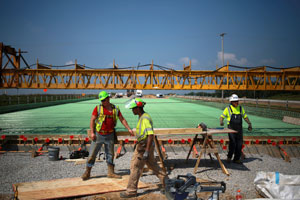Goldman Sachs: Trump’s Revamp of America to Boost Commodities From Metals to Gas

Spending by the Republican, who is set to enter the White House after defeating Hillary Clinton, will support construction activity and boost steel, iron ore, nickel, zinc and diesel, analysts including Damien Courvalin and Jeffrey Currie said in a Nov. 9 report. Trump’s proposal to roll back emissions-reduction targets could lift demand for natural gas as less uncertainty over policy boosts investment in an already competitive source for power and petrochemical production, according to the bank.
Trump has signaled spending of more than $500 billion to rebuild U.S. infrastructure with a pledge to at least double Clinton’s estimated $275 billion, five-year plan for roads, airports and bridges. The billionaire businessman, who has never held public office, defeated his rival after a campaign that exposed searing divides in the American public. He’ll have a Republican-controlled Congress behind him after the party shocked Democrats by keeping control of the Senate.
“The clearest message delivered by Donald Trump in his election victory speech was a focus on greater infrastructure spending in the U.S.,” the analysts wrote in the report. “Without specific details, it is hard to quantify the impact on commodity demand, however such policies would support steel, iron ore, zinc, nickel, diesel and cement.”
While the president-elect is seen removing policy uncertainty and triggering greater investment in the United States., an increase in perceived geopolitical risks and possible restrictions on international trade have rattled global markets. Prices of raw materials and shares of the companies producing them recovered after being whipsawed as investors wrestled with the implications of Trump’s win on Wednesday.
Under current consumption patterns, Trump’s infrastructure plan may have only a “modest impact” on the global steel market as the United States represents only 7% of worldwide demand and the nation’s steel per capita consumption is only half of China’s, according to Goldman. However, U.S. and developed-market infrastructure spending has been stagnant since the 1970s, suggesting that a catch-up in investment still could lead to a significant recovery in steel demand, its analysts said.
U.S. infrastructure spending is unlikely to kick in until the third quarter of 2017, at the same time as the impact of Chinese stimulus is likely to fade, “so rather than be outright bullish it may simply smooth the path of slowing Chinese demand growth for base metals in the second half of 2017 and 2018,” according to the bank.
While Trump’s proposals to roll back emissions-reduction targets would suggest greater demand for coal, natural gas might be the real beneficiary, according to Goldman. The fuel is competitive with coal in the power industry as well as against liquids in the petrochemical sector.
“China’s policy to support domestic and in turn seaborne coal prices, which we believe will likely be in place until the end of the decade, further increases the competitiveness of gas in the power market globally,” the analysts wrote.
Trump’s victory also will support U.S. oil and gas production, with less regulation on exploration and a lifting of drilling restrictions in certain locations, the Goldman analysts wrote. But the impact could be initially offset from renewed sanctions on Iran, which could prompt the Persian Gulf state to maximize production in the short term rather than comply to an OPEC freeze, they said.
The effect on agriculture probably will be bearish for U.S. demand and acreage, the bank said. The introduction of tariffs on imported goods could further raise the risk of retaliatory measures, which would affect U.S. agriculture, given the size of U.S. corn and soybean exports to China, Goldman said. This would then increase demand for Latin American exports to the detriment of U.S. shipments, according to the bank.



